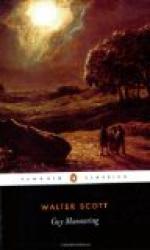He could not help feeling surprise at a coincidence so singular and unexpected. ’Does the devil mingle in the dance, to avenge himself for our trifling with an art said to be of magical origin? Or is it possible, as Bacon and Sir Thomas Browne admit, that there is some truth in a sober and regulated astrology, and that the influence of the stars is not to be denied, though the due application of it by the knaves who pretend to practise the art is greatly to be suspected?’ A moment’s consideration of the subject induced him to dismiss this opinion as fantastical, and only sanctioned by those learned men either because they durst not at once shock the universal prejudices of their age, or because they themselves were not altogether freed from the contagious influence of a prevailing superstition. Yet the result of his calculations in these two instances left so unpleasing an impression on his mind that, like Prospero, he mentally relinquished his art, and resolved, neither in jest nor earnest, ever again to practise judicial astrology.
He hesitated a good deal what he should say to the Laird of Ellangowan concerning the horoscope of his first-born; and at length resolved plainly to tell him the judgment which he had formed, at the same time acquainting him with the futility of the rules of art on which he had proceeded. With this resolution he walked out upon the terrace.
If the view of the scene around Ellangowan had been pleasing by moonlight, it lost none of its beauty by the light of the morning sun. The land, even in the month of November, smiled under its influence. A steep but regular ascent led from the terrace to the neighbouring eminence, and conducted Mannering to the front of the old castle. It consisted of two massive round towers projecting deeply and darkly at the extreme angles of a curtain, or flat wall, which united them, and thus protecting the main entrance, that opened through a lofty arch in the centre of the curtain into the inner court of the castle. The arms of the family, carved in freestone, frowned over the gateway, and the portal showed the spaces arranged by the architect for lowering the portcullis and raising the drawbridge. A rude farm-gate, made of young fir-trees nailed together, now formed the only safeguard of this once formidable entrance. The esplanade in front of the castle commanded a noble prospect.
The dreary scene of desolation through which Mannering’s road had lain on the preceding evening was excluded from the view by some rising ground, and the landscape showed a pleasing alternation of hill and dale, intersected by a river, which was in some places visible, and hidden in others, where it rolled betwixt deep and wooded banks. The spire of a church and the appearance of some houses indicated the situation of a village at the place where the stream had its junction with the ocean. The vales seemed well cultivated, the little inclosures into which they were divided




